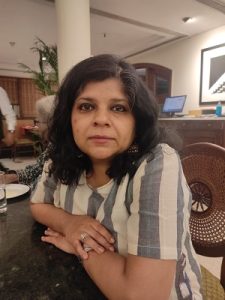
In an evolving landscape of book publishing, the Delhi-based Yoda Press, founded in 2004 by Arpita Das, created a niche for itself through its ‘alternative publishing vision’, which is a testament to its commitment to exploring subjects or topics ignored by larger publishing houses. One of the key aspects of this vision is the publishing house’s dedication to subjects such as sexuality and LGBTQ writings, which have become its core strength.
While many mainstream publishers refrain from these topics, Das had the audacity to step into a list that was not mainstream. “The alternative publishing vision is the idea about developing a list of subjects that are generally not touched upon by the established publishing houses, even though they are an important part of the discourse,” Das says.
Citing the example of Kali for Women, a feminist publisher in India criticized initially for its list of unconventional subjects during those times but was successful later, Das says, “Many independent publishers are being laughed upon when they start with an unconventional line-up, but later on after acceptance, many established publishers pitch into the same genre.”

As the distinctiveness of a book is not only in the subject but also in its curatorial process, Ishita Gupta, commissioning editor and manager, Yoda Press, highlighting her curatorial process, says, “The process for me is the combination of gut feeling, production capabilities, and editorial ability.”
Editorial improvements in shaping the manuscripts into a book is the first step, followed by assessing the book’s marketing and production capabilities. The later stages involve discussions with Das to assess whether the content of the manuscript aligns with the ethos of Yoda Press.
The publishing house is the go-to place for authors such as Harsh Mander, Anuradha Kumar, Pamela Philipose, and many more. It was the publisher of Harsh Mander’s India Exclusion Report for four years by the Center for Equity Studies. His solo books such as Between Memory and Forgetting were also published by Yoda Press.
Publishing as a political act
Das says bringing the subject or the words of the book in front of the audience is not just limited to the market but a political statement. “Publishing is a political act. Everything personal is political and political is personal,” Das says. “It’s a statement of mediocrity that it has been reduced to do something with the market or commerce alone. But when it first began, it was a political act. For us, it continues to date.”
Having LGBTQ topics is a clear indication of the publishing house’s progressive views. The books have the potential to challenge norms and provoke and question the status quo. “Everything we do is done with a full thought process of the politics behind it and whether or not it is politics that we can stand behind,” Gupta says.
Audience outreach
Srishti Khare, editorial assistant, Yoda Press, believes the publishing house has its own kind of audience because of its name in the publishing business, the kind of topics it prefers, and the kind of politics it adheres to. “Along with our niche audience, we attract our audience through book reviews, newsletters, and podcasts. Understanding the feedback in our book reviews plays a major role in understanding the needs of the audience and then developing our agenda and marketing roles accordingly.”
“We would love it if everyone picked up a copy of our book and read it,” Gupta says.
Changes in the market
Even though in the due course of time, technological advancements have brought a change in the readership mode and reader’s preferences, Gupta believes there are certain things that haven’t changed. “Traditional mainstream publishers have always been conservative when it comes to experimenting with new ideas or technologies.” In an era where eBooks and audiobooks have become integral to the reading experience, some publishers are wary of such changes. The resistance to change is not a recent phenomenon, it has persisted over the years.”

Gupta says the publishers adapted to the digital era when they realized they had no choice. Das adds, “Although it’s a personal choice, the resistance to change reading habits is out of arrogance. Earlier they discarded the bookstagrammers but now they are reaching out to them as they realized they are the lifeblood for book reviews.”
However, Gupta, who believes in the power of diverse voices, says that in the last 8-9 years, the conversation around controversial or taboo topics has increased because of the diverse range of authors coming to the forefront.
Shedding light on the transformative role of the internet, particularly social media, Das says it has been a boon because it can reach to the millennials and Gen Z, who are buying their own books. Another boon is the online selling of books as it brought about transparency in the whole business of book publishing.
India a bad distributor market
Das feels the distribution of books in India is a complex web of challenges as well as a bad and unethical market. “In a poor and unethical distribution market like India, online selling of books helped us immensely because at the end of the month, we have our money in our bank account.”
She points out the issues of delayed payments to the publishers. These payments are not just revenue but the capital for the publishing house’s next book. “Due to the unreliable nature of the distribution market, some big publishers are forced to have their own sales team to bypass the problem, which is not common in the international market.”
Das says the distribution teams are not book lovers, so they don’t care about the book but only about the business. “For a commodity like a book, it is a problem because it is a cultural artifact even in today’s time,” Das says.
With an optimistic perspective, Khare believes bookstores are a good middle person for books. Unlike the distribution market, they care about books and know the content. “Putting up our books in independent bookstores and in the eBook format helped us survive and be more resilient,” she says. This perspective underscores the importance of bookstores as more than just retail outlets.
Showcasing her faith in the bookstores, Das says, “You be my middle person because at least I know that you know what’s in the book we produce.”
















